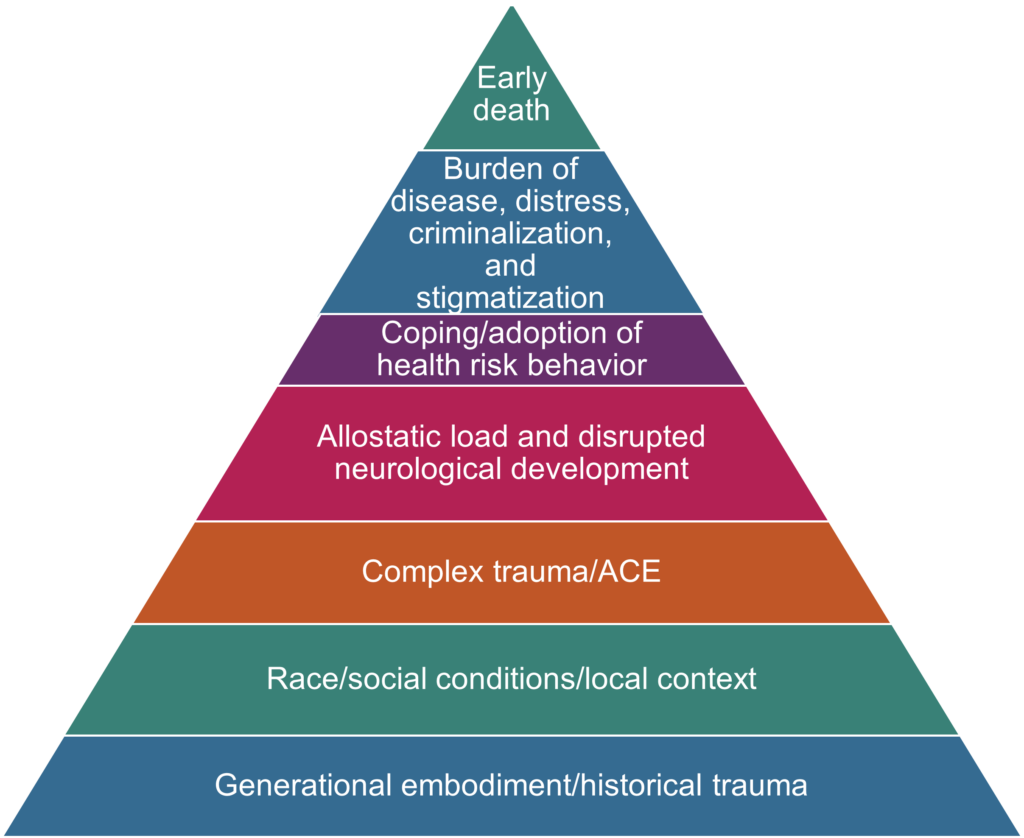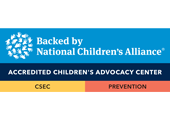Adverse Childhood Experiences: The Hidden Public Health Crisis
March 20, 2023
In 2014, Pediatrician Nadine Burke, later appointed as Surgeon General of California (2019-2022), presented a TedTalk which summarized a major public health crisis impacting Americans. Dr. Burke Harris stated:
In the mid-’90s, the CDC and Kaiser Permanente discovered an exposure that dramatically increased the risk for seven out of ten of the leading causes of death in the United States. In high doses, it affects brain development, the immune system, hormonal systems, and even the way our DNA is read and transcribed. Folks who are exposed in very high doses have triple the lifetime risk of heart disease and lung cancer and a 20-year difference in life expectancy. And yet, doctors today are not trained in routine screening or treatment. Now, the exposure I’m talking about is not a pesticide or a packaging chemical. It’s childhood trauma.”
When Dr. Burke Harris references childhood trauma, she explains that this term falls under a larger category of what is called Adverse Childhood Experiences (ACE). The Centers for Disease Control and Prevention (CDC) define ACE as “…traumatic events that occur in childhood such as experiencing violence, abuse, or neglect, witnessing violence in the home or community and/or having a family member attempt or die by suicide. Also included are aspects of the child’s environment that can undermine their sense of safety, stability, and bonding, such as growing up in a household with substance use, mental health problems, or instability due to parental separation or household members being in jail or prison.” According to the CDC, 61% of adults surveyed had experienced at least one type of ACE before age 18, and nearly 1 in 6 reported they had experienced four or more.
The original ACE study in the 1990’s, in which more than 17,000 individuals across 25 states participated, found a direct link between a high of number of ACEs causing greater negative outcomes across the span of a person’s life.
This is illustrated by the CDC’s ACE Pyramid:

Additional surveys taken in the late 2010’s, assessing the impacts of ACE in smaller and more diverse communities have replicated this link and identified that the impacts of ACE may also increase the risk for the commercial sexual exploitation of children.
With such profound results and studies about ACE, it is concerning that so many in the general public haven’t heard of it. In our community engagement and education efforts, Children’s Cove has often found that even professionals and community members have heard not of ACE.
We believe that the best way to mitigate the lifelong impacts of Adverse Childhood Experiences in our communities is by talking about it.”
It is hard to understand how a public health crisis of this magnitude goes largely unnoticed or unknown in the general community. It certainly isn’t due to the lack of evidence-based information. So why is this? Dr. Burke Harris offers a theory in her TedTalk:
You know, at first I thought that we marginalized the issue because it doesn’t apply to us. That’s an issue for those kids in those neighborhoods. Which is weird, because the data doesn’t bear that out… If I were to ask how many people in this room grew up with a family member who suffered from mental illness, I bet a few hands would go up. And then if I were to ask how many folks had a parent who maybe drank too much, or who really believed that if you spare the rod, you spoil the child, I bet a few more hands would go up. Even in this room, this is an issue that touches many of us, and I am beginning to believe that we marginalize the issue because it does apply to us. Maybe it’s easier to see in other zip codes because we don’t want to look at it. We’d rather be sick.”
Is this the case? Is the lack of awareness, conversation and acknowledgement of the problem exist because it impacts so many of us?
Let’s find out.
The full questionnaire in the original ACE study was very comprehensive with more than 200 questions. So, in order to help more people, the organization ACEs Too High winnowed down those questions to a simple questionnaire, and here it is:
Prior to your 18th birthday:
- Did a parent or other adult in the household often or very often swear at you, insult you, put you down, or humiliate you or act in a way that made you afraid that you might be physically hurt?
- Did a parent or other adult in the household often or very often push, grab, slap, or throw something at you or ever hit you so hard that you had marks or were injured?
- Did an adult or person at least 5 years older than you ever touch or fondle you or have you touch their body in a sexual way or attempt or have oral, anal, or vaginal intercourse with you?
- Did you often or very often feel that no one in your family loved you or thought you were important or special? Or your family didn’t look out for each other, feel close to each other, or support each other?
- Did you often or very often feel that you didn’t have enough to eat, had to wear dirty clothes, and had no one to protect you? Or were your parents were too drunk or high to take care of you or take you to the doctor if you needed it?
- Were your parents ever separated or divorced?
- Was your mother or stepmother often or very often pushed, grabbed, slapped, or had something thrown at her or sometimes, often, or very often kicked, bitten, hit with a fist, or hit with something hard, or ever repeatedly hit over at least a few minutes or threatened with a gun or knife?
- Did you live with anyone who was a problem drinker or alcoholic, or who used street drugs?
- Was a household member depressed or mentally ill, or did a household member attempt suicide?
- Did a household member go to prison?
Every time a person answers “yes” to one of the above questions, it is an affirmation of an Adverse Childhood Experience.
Regardless of the total number, it is important to understand that individuals may be negatively impacted across time, however, it is not a given. There is hope for a better future when positive experiences, protective factors, and early-intervention efforts are implemented following trauma. These mitigating actions can reduce the influence of ACE to lessen the unhealthy impacts across someone’s lifespan.
We believe that the best way to mitigate the lifelong impacts of ACE in our communities is by talking about it. We need to continue conversations in our family and friend groups, ask teachers, counselors, and pediatricians if they have heard of the ACE study and if not, ask them to learn about it. Our society needs the ACE study to become a requirement in higher education degrees for those who wish to work in counseling, social work, or medicine.
It can be hard for individuals to acknowledge ACE experiences, but in doing so it may change the narrative of one’s own childhood and relationships with family and friends. It can also be beneficial to prevention efforts by helping to identify ways in which families and communities could reduce the likelihood of ACE in the next generation.
Understanding protective factors and working as a community to support children and families is critical, as well as acknowledging the impacts of ACE and how to reduce the effects of these experiences through early intervention. As a Child Advocacy Center for Cape Cod and the Islands, Children’s Cove will utilize evidenced based practices to help children who have experienced violence and abuse. Our network of community providers is here to offer hope and healing to mitigate the long-term impacts of trauma.
If you would like to learn more about how we can create a community where children are free of abuse, have a voice that is heard, and can enjoy healthy, safe, and empowered lives, please contact Jacob Stapledon, Community Engagement and Education Program Manager at Children’s Cove.






